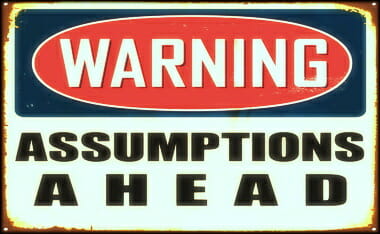So they have a little section addressing something similar that's helped to form my understanding of these assumptions and why we differ sometimes. These are the words of Tim and Shawna Gaines highlighting an idea they got from the great William Cavanaugh.
Each of the influential political philosophers understood humans as completely autonomous individuals first, linked only loosely by the idea that we must be fair to one another, usually by making contracts with one another. As they understood it, humans were not closely knit creatures of relationality but those for whom violence against one another is only a few short steps away, making contracts (such as governmental constitutions) necessary to maintain the rights of these unrelated individuals.
Yes, this is a pretty basic summary of western political theory, but it's framed in a way that's helpful for Christians mostly because it sets up an easy dichotomy between conservative and liberal approaches.
You can see then how conservatives tend to be conservative with these relationships, only engaging in contracts with others as much as they have to, with the expectation that more contracts equals more harm - mostly because they recognize people are selfish. Liberals, on the other hand, tend to be more liberal with these relationships because they see outside forces as most responsible for engendering selfishness in human beings.
I have to be reductionistic, but it's essentially "people are basically good" vs "people are basically evil." It's essentially political philosophy as a battle between optimism and pessimism. Liberals tend to say, "if we can only align these outside forces properly, everything will run smoothly;" while conservatives tend to say, "interactions between people are inherently messy, so let me have as few as possible and things will run smoothly."
There's no real mystery why these philosophies are at odds.
I think I get into trouble in my political discussions because my friends are trying to put me in one box or the other, when I don't really see myself in either. I try to take a specifically Christian approach to politics (and politics in the broader sense: every interaction people have with one another, not simply the machinations of government). As I see it, this Christian approach is not an either/or proposition, where I'm choosing one of the above options. It's a both/and situation, where I am affirming the correctness of both.
People are inherently selfish, and even if our most sincere desire is to be otherwise, we're still going to act in our own interest a lot of the time. But people are also inherently interconnected - you can no more isolate yourself and remain human than a caterpillar can refuse to become a butterfly. You can refuse to build the cocoon, but you're going to end up dead.
So a conservative might say "X is not the place of gov't," and liberal might say, "X is the responsibility of gov't." I say, "who cares?" It really feels like arguing over how to get peas from the plate to your mouth. You like a spoon; he likes a fork; that other guy prefers chopsticks. I'm far more concerned that the person gets to eat.
Yes, that still means we have to figure out how to do it - but that discussion (at least with me) will be based around practicality and not some preconceived notion of what government is or should be. I don't have a political philosophy (at least not in the traditional sense of the term).
I'd just ask that we talk about the merits of some issue or problem, rather than how it lines up with some overarching political ideal. I don't believe in political ideals, so it'll be hard to have that conversation with me. I'd never thought about assumptions in quite the way the Gaines' and Cavanaugh put it above - perhaps others haven't either. Maybe this will help all of us talk together more civilly in the future?
One can hope anyway.

No comments:
Post a Comment